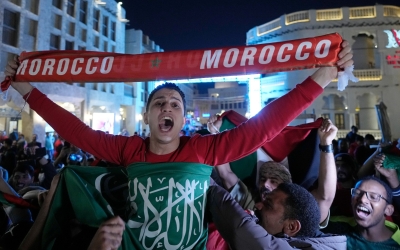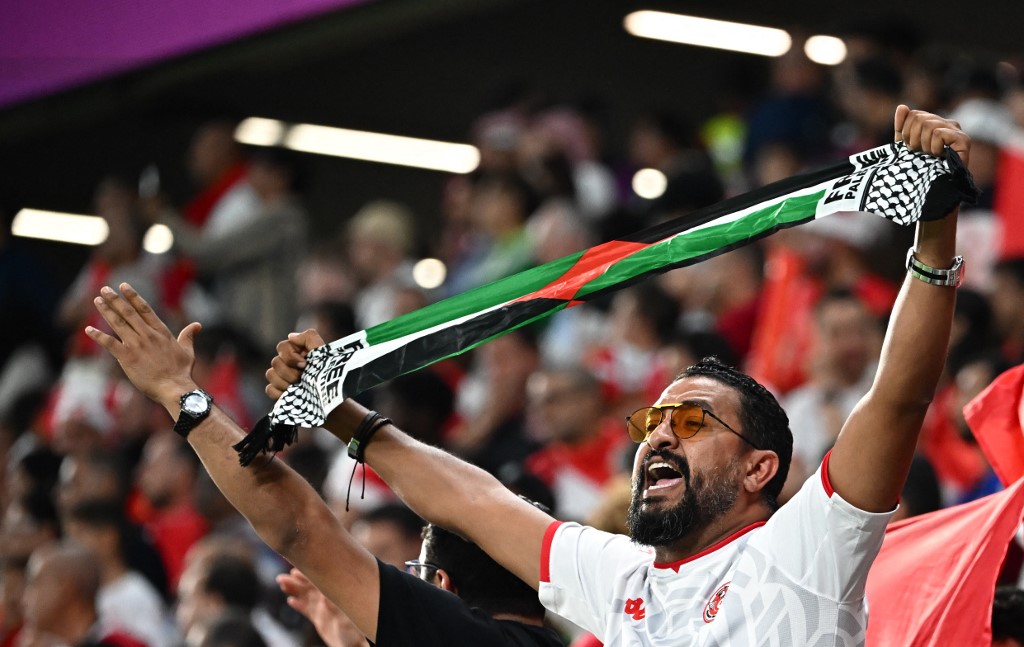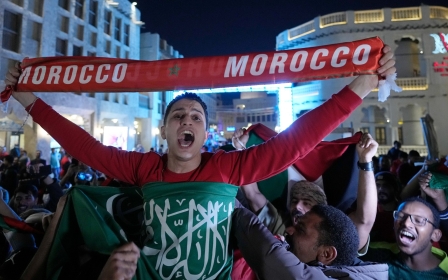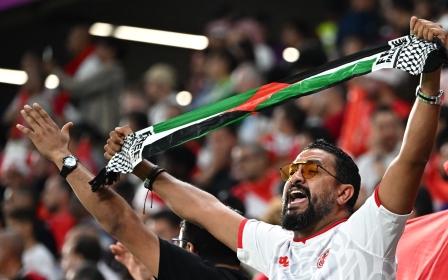Why Palestine is at the heart of what it means to be Arab
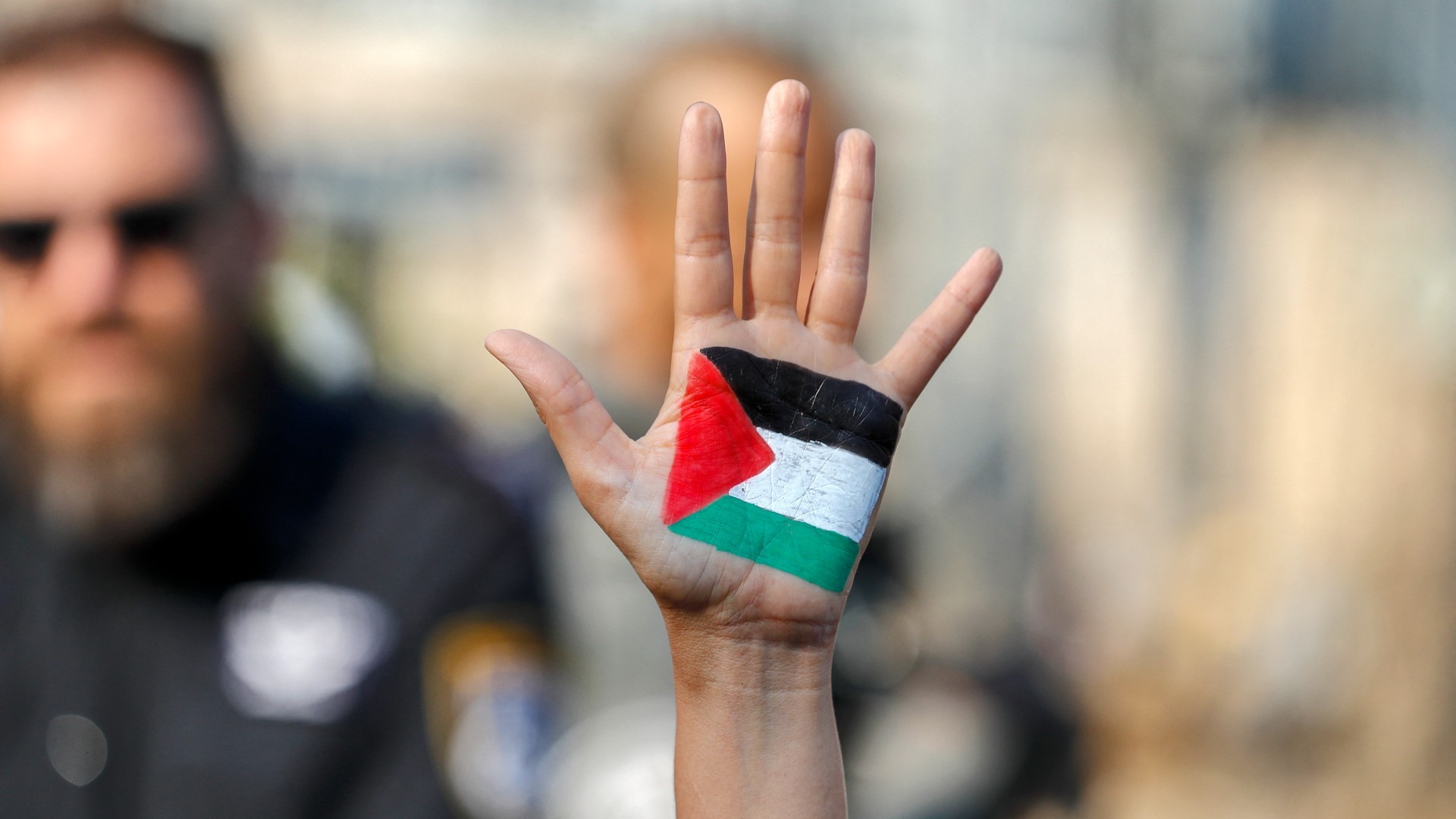
The Arab joy at the sporting achievements of the Moroccan football players at the World Cup in Qatar was spontaneous and inspiring.
This enthusiasm across the Arab world has not been dimmed by the fact that many, if not most of the players, were born and live outside of Morocco - several speak the Moroccan Darija dialect of Arabic - or are from Amazigh backgrounds. Nor is this support diminished by the fact that the players represent a country that has, like several other western-backed Arab states, established formal relations with Israel.
If there is a single tenet of modern Arab identity that brings together Arabs it is the understanding of the profound ongoing injustice of colonial Zionism
The opposite in fact: Arab sporting solidarity reflects something far more genuine. Arabs identify with a team which has posed several times with the Palestinian flag to signify a widespread commitment to a cause that has long been central to modern Arab identity.
In 1956, the anticolonial Syrian constitutional scholar Edmond Rabbath insisted that "Israel will ensure Arab unity. If this does not happen, there will be no more Arabs." By this Rabbath captured the crucible of Arabism in the modern world.
He understood that being Arab was more than a question of religion or language, though both Islam and the Arabic language have obviously shaped Arabness for centuries. Rather, it emerged as a deliberate will to commonality in a region where religious and ethnic differences have often been weaponised.
New MEE newsletter: Jerusalem Dispatch
Sign up to get the latest insights and analysis on Israel-Palestine, alongside Turkey Unpacked and other MEE newsletters
The question of Palestine was and remains at the heart of this modern ecumenical will.
Western division, Arab unity
As a Christian Arab from Aleppo who had fought French domination in his native Syria in the 1930s and 1940s, Rabbath understood how western colonialism repeatedly sought to turn one of the great hallmarks of the Middle East - its rich heritage of religious and ethnic pluralism - into a sectarian millstone. French and British imperialists fuelled sectarianism in the Middle East while they promoted themselves as indispensable civilisers of what they described as perpetually antagonistic native communities.
Rabbath saw how this colonial myth was promoted in every European-dominated land in North Africa and the Arab East. Having defeated the Ottomans, western powers cynically undermined the idea of secular post-Ottoman Arab unity.
Nowhere was this more ominous than in multireligious yet overwhelmingly Arab Palestine in which colonial Britain militarily and ideologically supported the coercive creation of an exclusively Jewish nationalist state.
In the shadow of this western colonialism, there have been many forms of Arabism. Some have been deeply reactionary, nationalistic, chauvinistic, conservative, repressive, patriarchal, and xenophobic; others far more beautiful and emancipatory.
In its most reactionary formulation, Arabism was wedded to what would quickly become despotic post-Ottoman state projects that feared religious and ethnic minorities as potential Trojan horses for western colonialism. In its most progressive contemporary formulation, however, Arabism has crystallised as a deliberate decolonial affiliation.
As Rabbath suggested in 1956, at the heart of this decolonial idea of being Arab is the centrality of Palestine as an ethic that unites Arabs of all faiths, regions, and classes in the modern era. Deny the idea of Palestine, and a significant part of anti-sectarian, progressive, ecumenical Arabism is destroyed.
Whereas Arabs are of many faiths and sects, and millions of Arabs do not necessarily speak Arabic (think of the huge diaspora communities outside the Arab world in North, Central, and South America as well as in Europe, who write and think primarily in English, French, German, Spanish or Portuguese), every Arab knows about Palestine.
If there is a single tenet of modern Arab identity that brings together Arabs from Morocco to Saudi Arabia, and from North America to Australia and Chile, it is this immediate understanding of the profound ongoing injustice of colonial Zionism. Given their own diversity, Arabs express this sense of burning injustice in different secular and religious idioms.
But beyond embodying a stand against injustice, Palestine also represents a positive non-sectarian fight for justice. Around the question of Palestine, Arab Christians, Muslims and anti-Zionist Jews have consistently forged a common solidarity against a dangerous European project that sectarianised religion and fused it with an exclusionary modern nationalism.
Amongst the earliest protests against colonial Zionism were "Muslim-Christian" associations that sprang up in the urban centers of Palestine in 1918 to protest the Balfour Declaration and that distinguished between their "native" Jewish compatriots and foreign Zionist settlers. Since at least that moment, and certainly since the 1930s when radio technology made its way across the Arab world as Palestinians engaged in one of the largest anti-colonial uprisings of the interwar era, Palestine became an index of Arabism.
This anti-colonial Arabism was nourished by the heady mobilisations in favour of the Egyptian nationalisation of the Suez Canal in 1956 and the Algerian revolution in the 1950s. It informed the outlook of the anti-colonial icon Gamal Abdel Nasser.
The centrality of Palestine
After the Arab defeat in 1967, however, major Arab states succumbed one after the other to the military hegemony of a US-backed and US-armed Israel.
The US then worked steadily to instil in Arabs the notion that Arab unity around the question of Palestine was a hopeless chimera. Since 1967, it has actively encouraged Arab despots to normalise with Israel despite its increasingly violent oppression of the Palestinian people.
The task at hand, said one confidential US State Department report from 1969, cited in Matthew F. Jacobs's book Imagining the Middle East: The Building of an American Foreign Policy, was the "de-Arabisation" of the Arabs. This was not about getting Arabs to abandon religion or language. Instead, it meant getting Arabs to properly "modernise" and thus to abandon their sense of collective identity and affiliation around Palestine and to ignore its ethical meaning to most people in the Arab world.
Arab leaders who normalise with Israel are thus immensely unpopular and undemocratic, while those resisting Israel are vested with popular legitimacy from Nasser in 1956 to Hassan Nasrallah in 2006.
For Arab populations, the question of Palestine obviously remains symbolically and ethically resonant, in part because of the horrific anti-Arab violence and racism of colonial Zionism, but also because of an identification with the pain of Palestinians as fellow Arabs.
Moroccan football players who have repeatedly unfurled the Palestinian flag at the World Cup in Qatar do so not to downplay Moroccan identity, but to emphasise an ongoing solidarity with their people in Palestine, and to remind the watching world that Palestine as an idea and as an ethic is fully compatible with the idea of being Arab (and being human) of any nationality or religion.
By the same token, the very centrality of Palestine has provoked a range of resentments as other peoples in the Arab world desperately seek to draw attention and raise awareness to their own particular and often desperate struggles against injustice and tyranny in their own countries. While Arab nationalist Baathist Iraq supported Palestinian liberation, it crushed Kurdish nationalist aspirations inside Iraq.
The Syrian government today still claims to support the idea of resistance to Israel, but ruthlessly oppresses its own citizens as well as many of its Palestinian refugees, while in Lebanon, third- and fourth-generation Palestinian refugees are denied basic rights.
And while Arab League states have long formally protested the repression of the Palestinians, they have been largely silent about the effacement (until relatively recently) of the histories of Amazigh and other ethnic and religious minorities in the Arab world.
Part of the problem, of course, is that post-colonial Arab states have played a sinister internal game of divide and rule.
Another problem is that the anti-colonial imperative for meaningful sovereignty has inculcated hostility to demands for what are seen as minoritarian cultural, and even more so political expression, especially when ethnic and religious minorities in the Arab world have made common cause with colonial France and Britain, anti-Arab Israel or the imperial US.
A decolonial Arab idenity
Still another part of the problem has been how the mid-20th century Arab nationalist states defined Arabism as a dogmatic one-dimensional militarised pan-Arab sovereignty that blotted out all ethnic and religious differences from an Arab identity.
The Arab military defeats at the hands of Israel inevitably threw this one-dimensional identification into crisis. In reality, Arabness has been defined and infused by innumerable religious, cultural, and political stimuli.
For far too long being Arab or being Kurdish or being Amazigh have been set against each other as a competitive zero-sum geopolitical game
Since the 19th century at least, it has been shaped by responses, engagements, and resistance to western encroachments and, in particular locales across the Arab world it has been influenced by myriad cultural, linguistic, and ethnic borrowings, interactions, and intermarriages with numerous non-Arab communities and peoples, whether Turkish, Amazigh, Kurdish, Armenian, Iranian, African, or South Asian.
For far too long being Arab or being Kurdish or being Amazigh have been set against each other as a competitive zero-sum geopolitical game. Yet just as one can’t be truly Arab in a multireligious Arab world without transcending religious difference; so too one can’t be a liberated Arab in a multiethnic Arab world without embracing and yet also transcending ethnic difference that is an inherent part of the Arab world.
This is where Palestine becomes especially relevant as a model for a revivified form of anti-sectarian ecumenical Arab identity, one that allows us to be both fully Arab and yet also able to recast the meaning of this Arab identity to be far more in correspondence with the worlds that Arabs actually inhabit, and to respect the histories and aspirations of all the other peoples and communities of the regions. Around the ethics of justice for Palestine progressive Armenians, Kurds, Turks, and Arabs have long made common cause.
And it is around a future that includes liberation in Palestine that provides an opportunity and a necessity for a reformulated Arab identity, one that abandons the myths of the nationalist past without abandoning the anti-colonial impetus of that past.
Identity, after all, is ultimately a secular affiliation, not a biological, ethnic, historical or linguistic imperative. And it is on this more expansive, more egalitarian, and more ecumenical basis that a truly decolonial future Arab world might yet emerge.
The views expressed in this article belong to the author and do not necessarily reflect the editorial policy of Middle East Eye.
Middle East Eye delivers independent and unrivalled coverage and analysis of the Middle East, North Africa and beyond. To learn more about republishing this content and the associated fees, please fill out this form. More about MEE can be found here.



